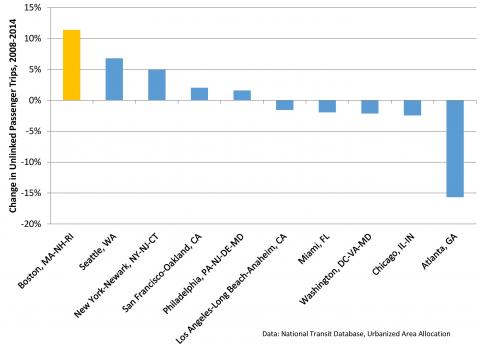It is generally considered than NYC, Chi, SF, Philly and Boston are the top 5 most traditionally urban cities in the US. They are the only cities that really offer the complete packaged: buzzy big cities downtowns with dense residential neighborhoods. Subways, Chinatowns, Skyscrapers, shopping streets, active public squares, dense built environments, etc.
However, Boston has always been the smallest of the 5. NYC and Chicago are so huge there status is forever assured. Boston has been closer to the Philly and SF. But, it doesn't quiet have the hyper-density of SF's core or the sustained urbanism of Philly. Outside the top 5, DC and Seattle seem to be closing in. DC has been nipping a Boston's heels. Traditionally held back by it's sterile downtown and relative lack of density, the city is rapidly remaking itself via a massive residential boom and bringing retail and restaurants back to the city core. Seattle is further behind, but has also taken a decidedly urban turn, with the city in full on Vancouverization model. The city has vast swaths of central land zoned for 440 footers that when completed will be one of the most vibrant areas in the county.
I can't help but wonder if some of the angst we see about height on this forum has less to do with the merits of the individual project and more about this generally sense of Boston's standing in the urban order. Boston is obviously growing and improving in absolute terms, but I wonder if there is some underlying angst about how the city is doing in relative terms when it comes to capturing the "urban imagination?" Maybe we are moving away from having only a handful of "true American big cities" into a messier world where the pecking order isn't a clear cut.
However, Boston has always been the smallest of the 5. NYC and Chicago are so huge there status is forever assured. Boston has been closer to the Philly and SF. But, it doesn't quiet have the hyper-density of SF's core or the sustained urbanism of Philly. Outside the top 5, DC and Seattle seem to be closing in. DC has been nipping a Boston's heels. Traditionally held back by it's sterile downtown and relative lack of density, the city is rapidly remaking itself via a massive residential boom and bringing retail and restaurants back to the city core. Seattle is further behind, but has also taken a decidedly urban turn, with the city in full on Vancouverization model. The city has vast swaths of central land zoned for 440 footers that when completed will be one of the most vibrant areas in the county.
I can't help but wonder if some of the angst we see about height on this forum has less to do with the merits of the individual project and more about this generally sense of Boston's standing in the urban order. Boston is obviously growing and improving in absolute terms, but I wonder if there is some underlying angst about how the city is doing in relative terms when it comes to capturing the "urban imagination?" Maybe we are moving away from having only a handful of "true American big cities" into a messier world where the pecking order isn't a clear cut.


